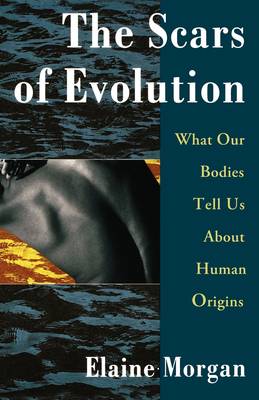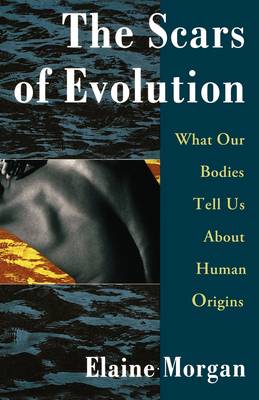
- Afhalen na 1 uur in een winkel met voorraad
- Gratis thuislevering in België vanaf € 30
- Ruim aanbod met 7 miljoen producten
- Afhalen na 1 uur in een winkel met voorraad
- Gratis thuislevering in België vanaf € 30
- Ruim aanbod met 7 miljoen producten
Zoeken
Omschrijving
When Elaine Morgan wrote The Descent of Woman in 1972, it sent shock waves around the world, and is now widely regarded as a key work on human evolution, and essential to any discussion of women's place in society. Now, with The Scars of Evolution, Morgan offers a pioneering look just where it was our earliest ancestors came from, and the legacy--not always advantageous--that they left us. As she sets out to solve one of the enduring riddles of our origins--to discover the evolutionary path that separated us from the rest of the animals--Morgan shows that many of the theories currently accepted by scientists cannot explain our unique features: they leave too many questions unanswered.
Millions of years ago, something happened to our ape ancestors that did not happen to the forebears of gorillas and chimpanzees, something that made them walk on two legs, lose their fur, sweat, develop larger brains, and learn to speak. While scientists have visited many a dig and studied many a fossil for clues, Elaine Morgan argues that all of the facts about our mysterious origins are right in front of us--in the form of fundamental flaws in the human design. Our propensity to suffer from lower back pain, obesity, varicose veins, acne, even infant death syndrome, is essentially the result of a cataclysmic event in our distant past.
Scientists have long observed that our spines were not made for upright walking. Yet natural selection--the basic tenet of evolutionary theory--dictates that enduring changes to a species occur because of the need to adapt to changes in the environment. While thousands of working hours are lost each year to "bad backs," at some point long ago it must have been an advantage to walk on two legs. The most common theory is that we became bipedal while hunting on the African savannah, needing our arms free for weapons, using an upright stance to see enemies from afar. But as Morgan points out, animals need more speed on the savannah, both for pursuit and flight, than two legs can offer. Her explanation: bipedalism emerged from life in an aquatic environment due to the flooding of the African rift valley millennia ago. The apes that suddenly found themselves stranded in swamp land (a swamp that remained for thousands of years) had to walk upright to keep from drowning. The human tendency toward obesity was once not an unsightly health problem, but rather a lifesaving form of insulation, one present in all aquatic mammals. And as Morgan carefully considers all of our other uniquely human traits--our relative hairlessness, our ability to control our breathing, our inability to maintain proper salt levels--a compelling case emerges for our human origins in a watery environment.
Lively, controversial, and presented with a brilliant logic, The Scars of Evolution will change the way you think about the world--and our place in it.
Millions of years ago, something happened to our ape ancestors that did not happen to the forebears of gorillas and chimpanzees, something that made them walk on two legs, lose their fur, sweat, develop larger brains, and learn to speak. While scientists have visited many a dig and studied many a fossil for clues, Elaine Morgan argues that all of the facts about our mysterious origins are right in front of us--in the form of fundamental flaws in the human design. Our propensity to suffer from lower back pain, obesity, varicose veins, acne, even infant death syndrome, is essentially the result of a cataclysmic event in our distant past.
Scientists have long observed that our spines were not made for upright walking. Yet natural selection--the basic tenet of evolutionary theory--dictates that enduring changes to a species occur because of the need to adapt to changes in the environment. While thousands of working hours are lost each year to "bad backs," at some point long ago it must have been an advantage to walk on two legs. The most common theory is that we became bipedal while hunting on the African savannah, needing our arms free for weapons, using an upright stance to see enemies from afar. But as Morgan points out, animals need more speed on the savannah, both for pursuit and flight, than two legs can offer. Her explanation: bipedalism emerged from life in an aquatic environment due to the flooding of the African rift valley millennia ago. The apes that suddenly found themselves stranded in swamp land (a swamp that remained for thousands of years) had to walk upright to keep from drowning. The human tendency toward obesity was once not an unsightly health problem, but rather a lifesaving form of insulation, one present in all aquatic mammals. And as Morgan carefully considers all of our other uniquely human traits--our relative hairlessness, our ability to control our breathing, our inability to maintain proper salt levels--a compelling case emerges for our human origins in a watery environment.
Lively, controversial, and presented with a brilliant logic, The Scars of Evolution will change the way you think about the world--and our place in it.
Specificaties
Betrokkenen
- Auteur(s):
- Uitgeverij:
Inhoud
- Aantal bladzijden:
- 208
- Taal:
- Engels
Eigenschappen
- Productcode (EAN):
- 9780195094312
- Verschijningsdatum:
- 17/11/1994
- Uitvoering:
- Paperback
- Formaat:
- Trade paperback (VS)
- Afmetingen:
- 140 mm x 217 mm
- Gewicht:
- 272 g

Alleen bij Standaard Boekhandel
+ 96 punten op je klantenkaart van Standaard Boekhandel
Beoordelingen
We publiceren alleen reviews die voldoen aan de voorwaarden voor reviews. Bekijk onze voorwaarden voor reviews.











